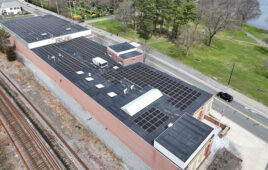Nonprofit group Solar United Neighbors will launch four solar co-ops in Ohio on May 9 in Cuyahoga County, Akron, Dayton and Youngstown. The co-ops aim to help homeowners and small business owners learn about solar together and purchase solar panels at a group rate from a single installer.
“Now more than ever, Ohioans interested in going solar need trustworthy information and access to competitive pricing,” said Tristan Rader, Ohio program director for Solar United Neighbors. “So, we’re launching these four co-ops virtually, complete with online information sessions and remote site visits from installers. Several folks signed up for the co-ops before we even launched them, and we’ve seen an uptick in interest from solar installers, too.”
The solar co-ops are cost- and commitment-free. Together, co-op members will learn about solar energy and leverage their purchasing power to obtain competitive pricing and quality solar installations. After a competitive bidding process facilitated by Solar United Neighbors, a group of volunteers from each co-op will select a solar company to complete the co-op’s installations.
Joining a co-op does not obligate members to purchase solar or chargers. Instead, each member will have the option to individually purchase panels and electric vehicle chargers based on the installer’s group rate.
“The co-ops will enable more Ohio residents to take control of their energy production and save money by harnessing solar power,” said Rader. “There’s a growing movement in Ohio to transform our electricity system into one that is cleaner, fairer and benefits local communities.”
State and federal incentives are available to Ohioans purchasing solar, too. In 2020, the solar Investment Tax Credit (ITC) is 26% of the full system cost. But it decreases to 22% in 2021. In 2022, it expires altogether for residential solar customers.
The Energy Conservation for Ohioans Program, or ECO-Link, offers a reduced interest rate to homeowners installing renewable energy, like solar, or making energy efficiency upgrades to their homes. Through this state program, homeowners can obtain an interest rate reduction of up to 3% on bank loans for up to seven years.
Solar United Neighbors will host an online event to launch the four solar co-ops on May 9 at 6 p.m. The event is free and open to the public. It will include a virtual solar home tour and a presentation about solar technology and economics.
“We’ll give attendees practical information about going solar and joining the solar co-ops,” said Rader. “Everyone’s welcome, whether they’re interested in joining a co-op or just want to learn more about solar energy.”
Solar United Neighbors has hosted 23 solar co-ops in Ohio since 2016. According to the group’s estimates, the 332 homes and businesses that now have solar panels because of co-ops represent: 2,200 kW of solar power and $5.6 million in local solar spending.
“My wife Heather and I simply believe this is the right thing to do, both from a moral and financial standpoint,” said Philip Leppla of Dayton, who went solar with a previous co-op. “We are saving money and helping the environment. It’s a win-win situation.
“We now have solar and two plug-in hybrid vehicles,” Leppla added. “We’ve reduced our carbon footprint and save a lot of money on a monthly basis since we are spending less on electricity and gasoline. After about a year and half since installation, we are extremely happy with our decision to go solar.”
News item from Solar United Neighbors





““Now more than ever, Ohioans interested in going solar need trustworthy information and access to competitive pricing,” said Tristan Rader, Ohio program director for Solar United Neighbors. “So, we’re launching these four co-ops virtually, complete with online information sessions and remote site visits from installers. Several folks signed up for the co-ops before we even launched them, and we’ve seen an uptick in interest from solar installers, too.””
Kind of like the startup a few years back in San Francisco, 1BOG, complete solar PV offerings allowing homeowners to get a “packaged deal” at wholesale rates. It seems like Ohio’s sporadic renewable energy “standards” are being brought along by the people and co-ops, instead of the Legislature and PUCO. Right now, there are solar PV packages out there that do solar PV and smart ESS, allowing another “option” in solar PV generation and implementation. With all of the lobbying going on now-a-days, wonder what Duke and AEP think about these (co-ops)?